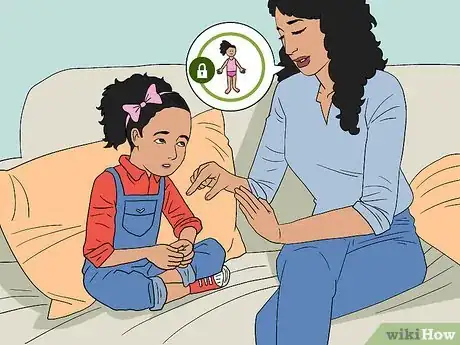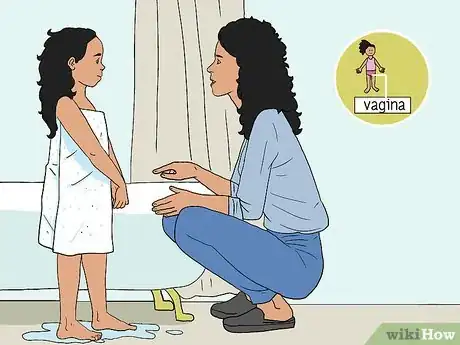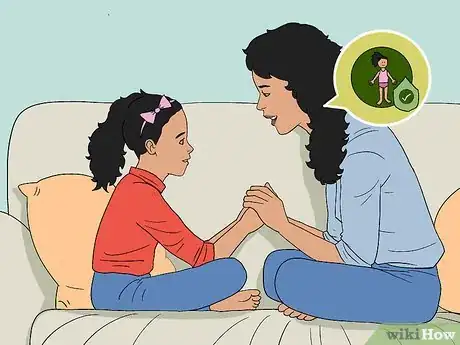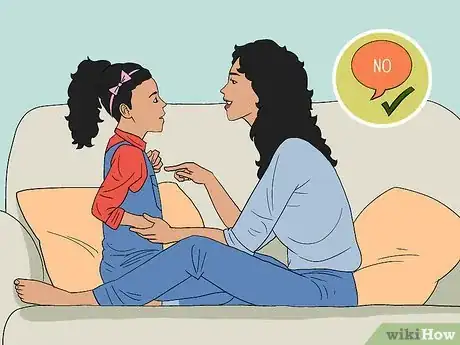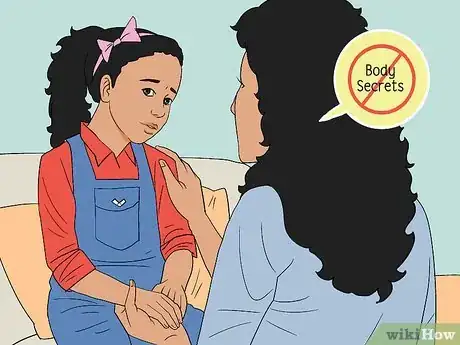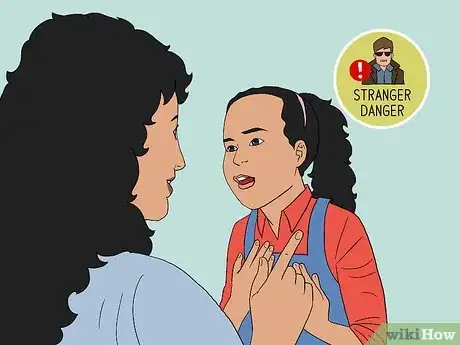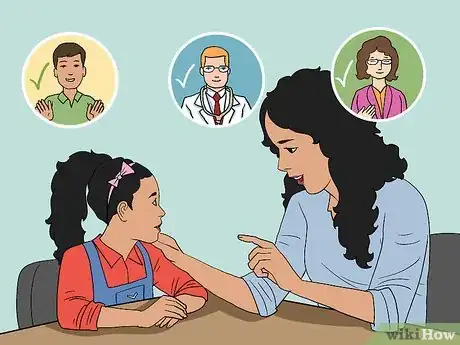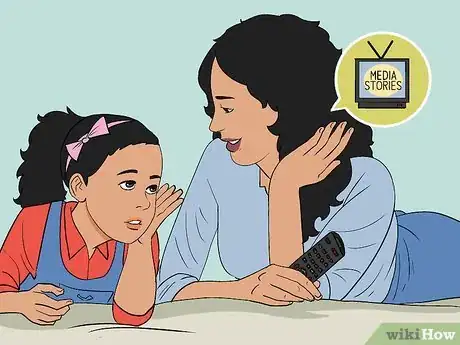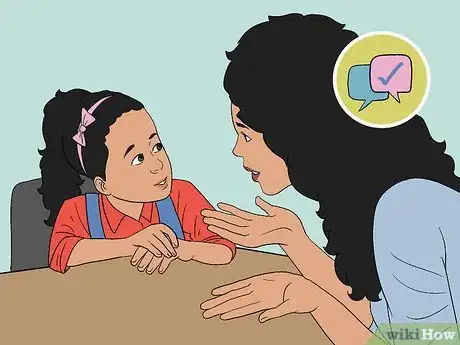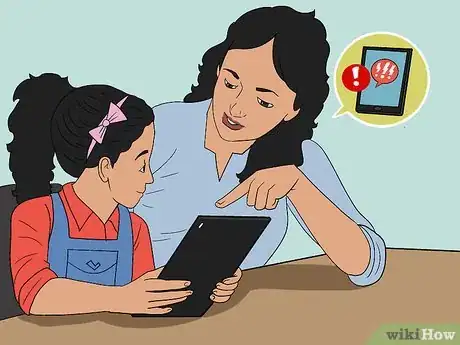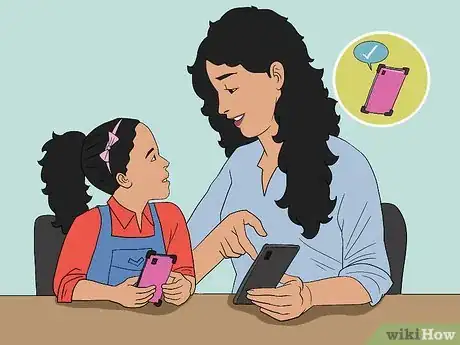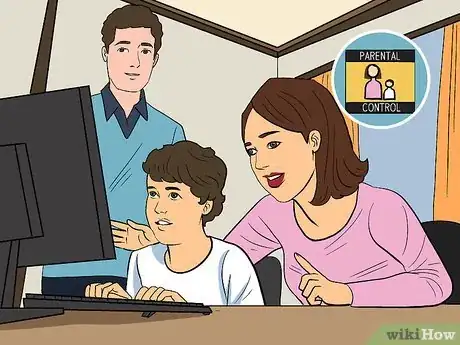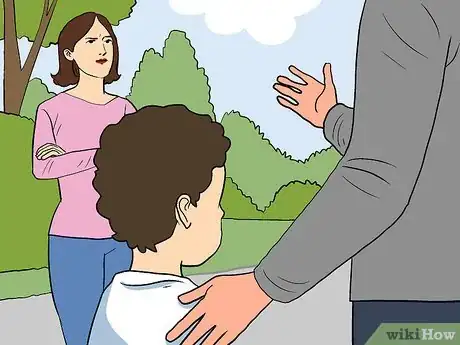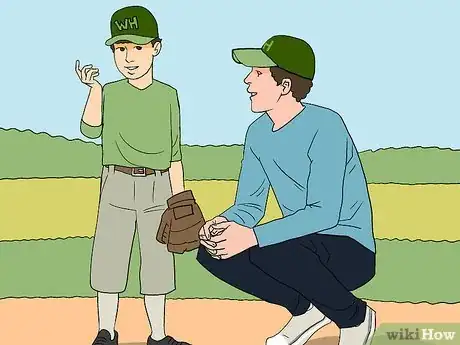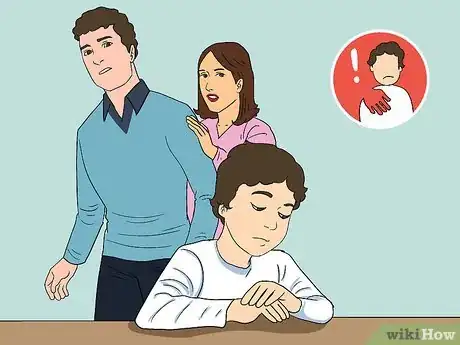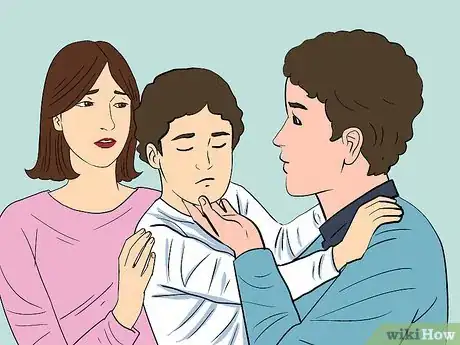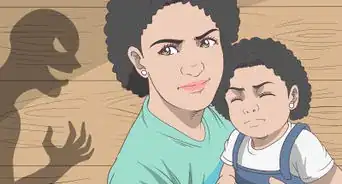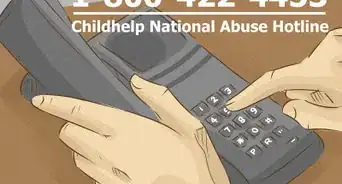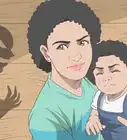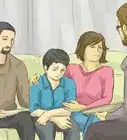This article was co-authored by Luigi Oppido and by wikiHow staff writer, Megaera Lorenz, PhD. Luigi Oppido is the Owner and Operator of Pleasure Point Computers in Santa Cruz, California. Luigi has over 25 years of experience in general computer repair, data recovery, virus removal, and upgrades. He is also the host of the Computer Man Show! broadcasted on KSQD covering central California for over two years.
There are 15 references cited in this article, which can be found at the bottom of the page.
This article has been viewed 44,038 times.
As a parent, it’s hard to even think about the possibility that someone might molest your child. Unfortunately, though, child molestation is all too common—roughly 10% of children are molested before the age of 18.[1] Experts agree that the actual incidence of child molestation is probably much higher, as many cases go unreported. You can help protect your child by educating them about their body and what kinds of behaviors are inappropriate from others. You can also keep them safe by supervising their interactions with other adults and teens as much as possible, both in person and online, and by knowing the signs of possible molestation.
Steps
Educating Your Child
-
1Teach your child which body parts are private. Before your child reaches the age of 3, begin telling them which parts of their body should not be touched or photographed by other people. It’s also important to let them know that nobody should ask your child to touch or look at someone else’s private parts. Bring this up repeatedly until your child understands. This will help your child quickly learn to recognize inappropriate behavior on the part of an adult or another child.[2]
- Once your child no longer needs their diapers changed, no other person should ever come into contact with their genitals, aside from a doctor or other healthcare provider.
- For example, you might say something like, “Your vulva is a private part of your body. It’s not okay for anyone else to touch it except for a doctor or nurse if they have to give you a checkup, and I’ll be in the room with you when that happens.”
- Explain that it is sometimes okay for private parts to be seen by other people as long as the visibility is merely incidental and the action is not sexual in nature. Examples could include sharing a bedroom with siblings, walking to and from the shower, peeing in a urinal (boys), or changing in a locker room.
Tip: A notable exception to these rules about touching is when a physician examines your child for medical reasons. Even this should be supervised by a parent until the child is old enough to protect themselves. Teach your child about this exception.
-
2Tell your child the correct anatomical terms for their privates. Using the proper anatomical terms instead of made-up terms when teaching your child about their private parts can help them avoid thinking these are shameful or embarrassing things that they shouldn’t talk about. It can also help them communicate more clearly to you or another trusted adult if something inappropriate happens.[3]
- For example, teach your child the words “penis” and “vulva” or “vagina.”
- Make sure your child understands the difference between their genitals and their “bottom.” You can also teach them anatomical terms, such as “buttocks” and “anus,” and explain the functions of each body part in an age-appropriate way to help them make the distinction.
Advertisement -
3Explain the importance of privacy to your child. Tell them that certain belongings, such as their bed and dresser, are private areas that others are not allowed to snoop in or be around without you being there. Similarly, teach them that nobody has the right to see them use the bathroom or bathe.[4]
- If you have a boy, talk about proper etiquette for using public restrooms and encourage him to speak up if he feels uncomfortable. On the other hand, crowded restrooms are often safer since the vast majority of users are not pedophiles.
- When teaching your child about their right to privacy, make sure they understand that they should always tell you if they think their privacy has been violated.
- Make sure your child understands that even authority figures, such as police officers and teachers, must respect their privacy in the same way as everyone else.
-
4Teach your child about bodily autonomy and the right to say no. Make it clear that if someone says they don't want to be hugged, poked, teased, kissed, tickled, or touched in any other way, this needs to be respected. Teach respect for boundaries in basic settings, like friends playing and siblings messing around, and they will have the skills to say no and recognize that it is not okay if others disregard that no.[5]
- Let your child have the right to decline hugs and kisses at any time. If they aren't in the mood to hug Grandma, they don't have to.
- If a child is disregarding another's boundaries, e.g., a brother pulling his sister's hair after she asked him to stop, step in. Say, "She said she doesn't like that, so you need to stop." This reinforces the importance of respecting a no.
-
5Let your child know that “body secrets” aren’t okay. Many abusers encourage their victims to keep the abuse secret. Explain to your child that these kinds of secrets are bad, and they should always tell you if someone tries to make them keep a secret about their body or about touch.[6]
- These kinds of secrets may be threatening, or they may sound more innocent. For example, the abuser might threaten to hurt the child, take something from them, or get them in trouble if they tell. They might also say something like “If you tell anyone what happened, they won’t let me play with you anymore!”
- Explain to your child the difference between harmful secrets and safe secrets (such as not telling their sibling about a birthday present).
-
6Teach your child about how to be safe with "strangers". Tell your child that they should never enter a stranger's house or car, accept gifts or food from a stranger. However, let them know that they can approach “safe strangers,” such as police officers, firefighters, teachers, or librarians, for help if necessary. But, teaching "stranger danger" isn't a good idea since most of the harms happen by someone the child already knows. Instead, teach them "tricky people", which asks them to identify potential predators by behavior. [7]
- Tell your child to never open the door to someone they don't know. You can make specific exceptions to this rule as you see fit (such as emergency situations when police or paramedics are needed).
- Tell your child to never reveal to anyone that they are home alone (should this ever be the case), and that this rule applies to in-person situations as well as over the phone and online.
- Inform your child that you can't tell whether someone is dangerous by their appearance, and that some bad people may appear normal or act nice.
Teach your child “No, Go, Yell, Tell”: Tell your child that if a stranger tries to approach them, offer them something, or take them somewhere, they should say “no” and run away while yelling as loudly as they can. They should then tell a trusted adult what happened as soon as possible.[8]
-
7Tell your child that the rules also apply to people they know. While teaching kids about stranger danger is important, keep in mind that most perpetrators of child sexual abuse are people the child knows. Make sure your child knows that it’s not okay for family members, friends, teachers, or anybody else they know to touch them inappropriately or violate their boundaries.[9]
- Say something like, “Your daddy or I or your doctor might need to touch your private parts sometimes if we need to help you clean them or put medicine on them, but nobody else should ever touch them—not your teachers, your friends, or even your aunts and uncles. Not even if you like them or they say it’s okay.”
-
8Discuss media stories with your child. Sex crimes are unfortunately not uncommon in the news media. When such topics come up, take the opportunity to discuss them with your child so that they know that they are a realistic danger. The more your child knows about the subject (up to a point appropriate for their age), the better they will be able to protect themselves and/or go to you for help if they find themselves at risk.[10]
- Ask your child questions such as, "What would you do in that situation?" or "Have you ever heard of this sort of thing before?" This will give your child the opportunity to talk to you and think about their potential actions in a dangerous situation.
-
9Encourage your child to communicate with you. This will help them learn that there are no situations in which their behavior or someone else's should be kept secret from you. Your child needs to understand that they can go to you about anything that makes them uncomfortable, and that you can be trusted to be on their side.[11]
- Say things like, "You can talk to me about anything in the world," or "I will always listen if there's something bothering you." Frequent reassurance is key to establishing open communication between you and your child.
- Let your child know that you would never be angry with them for telling you the truth about something, especially something as significant as being molested.
-
10Teach your child about the dangers of internet predators. Many sexual predators operate online and will try to lure children into inappropriate online interactions. You should warn your child to be careful if they answer emails or online messages from strangers and to report someone if they say inappropriate things in a chatroom, especially anything involving discussion of private body parts. You should also tell your child not to share any private information with individuals they do not know online and to talk to you right away if they feel uncomfortable with how someone is interacting with them online.[12]
-
11Give your child strategies for handling dangerous situations. Your child will feel more empowered to deal with potentially abusive situations if you talk to them ahead of time about how to handle it. Discuss things your child can do if someone’s behavior is making them uncomfortable, such as excusing themselves to go to the bathroom if someone is trying to see or touch their private parts.[13]
- For older children, discuss using a special code word if they feel unsafe or want you to come pick them up. For example, if they’re at a friend’s house, they can call you and use a word or phrase that won’t sound suspicious to the abuser (like “Did you walk Baxter today?”).
Taking Parental Precautions
-
1Screen individuals your child will be around. Don't assume your child is safe because they are in a professional environment such as a school, daycare center, or camp. You should personally evaluate anyone (especially adults) with whom your child will be spending time without your supervision. If you feel at all uncomfortable with an individual or situation, do not risk it.[14]
- For example, before hiring a babysitter or other individual caregiver for your child, ask for personal and professional references. You can also check for their name in local or national sex offender registries (such as https://www.nsopw.gov/ if you live in the U.S.).
- Before putting your child in a school, camp, or daycare, find out if the facility is licensed. Interview the administration to find out how their staff members are vetted and trained.
- In cases where you aren't necessarily able to choose or pre-screen individuals who will be around your child, do your best to get to know these people by meeting them in person and asking them questions.[15]
- Do not agree to sleep-overs for your child until you are familiar and completely comfortable with your child's friend's family and home.
-
2Monitor your child's online activities. Review your child's internet history every week to ensure there is no suspicious activity. Look for any inappropriate links they may have opened or pornographic images that appear in their email or messages. Many predators will send images or messages as a way to lure children.[16]
- You may also want to keep the computer in a common space, like the living room or the dining room, so your child cannot go on the computer unmonitored. This will make it more difficult for them to fall into inappropriate interactions online.
- You can install software on the computer or parental control apps on your child’s mobile devices that will block sites that are considered inappropriate for children. Some popular options include Net Nanny, Norton Family Premier, and Kaspersky Safe Kids.
-
3Minimize your child's alone time with other adults. The less time your child spends alone with an adult or teenager, the lower the potential for molestation to occur. Any time your child must be with another adult, it is best that their time be spent in public or with multiple adults present. Most molestation occurs when children are alone with their attacker.[17]
- Overnight trips, even those sponsored by your child's school or church, should always have more than one adult chaperone. Do not allow your child to attend a trip on which only one adult will be present.
Tip: It’s healthy for children to spend time one-on-one with trusted adults other than their parents. To help protect your child while also encouraging healthy relationships, take precautions such as dropping in unexpectedly during your child’s alone time with another adult, making sure they spend time together in public, and talking to your child afterward about how their time went.[18]
-
4Be vigilant for inappropriate interest in your child from adults or teens. You should be skeptical of any adult who seems to be exceptionally interested in your child or who wants to spend time alone with them. Non-relatives who are extremely generous toward your child should raise a red flag, especially if there is no clear reason for this behavior.[19]
- Avoid one-on-one outings between your child and an adult who is not your child's caregiver or relative, especially when you yourself did not arrange it.
- Beware of individuals who at first seem interested in becoming friendly with you but then show more interest in getting to know your child instead.
- Keep in mind children can also be molested by other children or children who are a little older than they are. You should also be aware of this possibility and note any warning signs in other children. For example, watch for behaviors such as ignoring others’ physical boundaries, talking about sexual subjects in an age-inappropriate way, or preferring the company of younger children rather than peers.[20]
-
5Take an interest in your child's life. Get involved as a volunteer, spectator, or chauffeur for your child's preferred afterschool and weekend activities. The more present you are in your child's life, the smaller the chance that your child will be victimized. Even asking your child simple questions about their day and the people they interacted with can help you to determine if something isn't right.[21]
- Your child will learn to recognize situations that are unacceptable if you commonly provide feedback about their daily activities and interactions.
- Ask open-ended questions about your child's experiences and about the people with whom they commonly interact (such as teachers, coaches, or pastors). This keeps the door open for your child to tell you if they experience an inappropriate situation.
-
6Check the sex offender registry for any offenders in your area. Be vigilant about any sex offenders who may be living in your area and try to discourage your child from hanging around their home or their street. Many sex offenders are required by law to identify themselves as sex offenders to individuals who live within a certain radius.
- If you live in the U.S., you can check the sex offenders listed in your state through the FBI website.[22]
-
7Familiarize yourself with the warning signs of child sexual abuse. There are a number of common indicators that your child has been or is at risk of becoming a victim of molestation or other sexual assault. Knowing how to recognize these signs will help ensure that you do not miss an opportunity to help your child if they end up in harm's way and feel unable to speak up. Common signs include:[23]
- Signs of depression
- Suicidal thoughts or actions
- Substance abuse at an early age
- Self-harming behavior
- Sudden and significant drop in grades or school attendance
- Dramatic changes in hygiene
- Extreme anxiety or nervousness about siblings' wellbeing
- Age-inappropriate sexual behavior, interest, or knowledge
-
8Watch for suspicious behavior in adults or teens. Although it can be very hard to tell who might be willing to commit child molestation, there are some common characteristics of individuals you should keep your child away from. These behaviors are not exclusive to strangers and should be looked out for even in family friends or authority figures. Examples include:[24]
- Preference for children's company over that of other adults
- Treating children as if they were adults in order to form a closer bond and help the child feel like an equal
- Frequently taking photographs of children, either dressed or nude
- Apparent obsession with teenager and/or child sexual activity
- Viewing of child pornography
- Offering alcohol or drugs to children or teens
- Showing children sexual images or talking about sexual topics in their presence[25]
- Allowing children to get away with behaviors that their parents or other caretakers wouldn’t normally allow
- Volunteering to work with children in some capacity, in combination with other troubling signs
-
9Believe your child if they tell you something troubling. Though it may be hard to hear your child talk about their inappropriate sexual experience, it’s important that you listen to them and tell them you believe what they are saying. It may be shocking to find out from your child that they have been touched inappropriately by a family member, close friend, or person you know well. But it is essential that you encourage them to tell you what happened and assure that you will help them deal with the trauma.
- Try to say clearly to them, "I believe you. Thank you for telling me."
Expert Q&A
-
QuestionHow can I teach my child about protecting their privacy online?
 Luigi OppidoLuigi Oppido is the Owner and Operator of Pleasure Point Computers in Santa Cruz, California. Luigi has over 25 years of experience in general computer repair, data recovery, virus removal, and upgrades. He is also the host of the Computer Man Show! broadcasted on KSQD covering central California for over two years.
Luigi OppidoLuigi Oppido is the Owner and Operator of Pleasure Point Computers in Santa Cruz, California. Luigi has over 25 years of experience in general computer repair, data recovery, virus removal, and upgrades. He is also the host of the Computer Man Show! broadcasted on KSQD covering central California for over two years.
Computer & Tech Specialist Tell them to think at least three times before saying anything about themselves. They should ask themselves, "Is this really necessary to share with a stranger?" In practically all cases, a stranger should never know identifying information about your child. In fact, it's not even safe for a child to share a picture of themselves. Reinforce to your child that they should never share their address; let them know that people can now use a reverse image search to find your child's social media platforms. Encourage your children to socialize with their own peers in real life and to steer clear of oversharing on the Internet.
Tell them to think at least three times before saying anything about themselves. They should ask themselves, "Is this really necessary to share with a stranger?" In practically all cases, a stranger should never know identifying information about your child. In fact, it's not even safe for a child to share a picture of themselves. Reinforce to your child that they should never share their address; let them know that people can now use a reverse image search to find your child's social media platforms. Encourage your children to socialize with their own peers in real life and to steer clear of oversharing on the Internet.
Warnings
- While criminal background checks and sex offender registries are useful tools, these should not be assumed to be perfect resources.⧼thumbs_response⧽
- Perpetrators of child molestation can be male or female, young or old, and of any race, nationality, social class, or religion.⧼thumbs_response⧽
- Avoid making your child overly fearful by overstating their risk of being molested. Try to find a middle ground between disregard and paranoia.⧼thumbs_response⧽
- Many perpetrators choose their victims based on their vulnerability and a perceived low likelihood of having the crime reported. This is why vigilance and precaution can be very helpful.⧼thumbs_response⧽
- If you are a single mother, be extra cautious about your child's male “role models,” as many child molesters are males who target children with no father at home.[27]⧼thumbs_response⧽
- Up to 93% of child molestation victims know the individual who molested them.[28]⧼thumbs_response⧽
References
- ↑ https://www.d2l.org/the-issue/
- ↑ https://childmind.org/article/10-ways-to-teach-your-child-the-skills-to-prevent-sexual-abuse/
- ↑ https://childmind.org/article/10-ways-to-teach-your-child-the-skills-to-prevent-sexual-abuse/
- ↑ https://www.stopitnow.org/ohc-content/tip-sheet-how-to-talk-to-your-child-to-reduce-vulnerability-to-sexual-abuse
- ↑ https://rainn.org/articles/how-can-i-protect-my-child-sexual-assault
- ↑ https://childmind.org/article/10-ways-to-teach-your-child-the-skills-to-prevent-sexual-abuse/
- ↑ http://archive.ncpc.org/topics/violent-crime-and-personal-safety/strangers.html
- ↑ http://archive.ncpc.org/topics/violent-crime-and-personal-safety/strangers.html
- ↑ https://childmind.org/article/10-ways-to-teach-your-child-the-skills-to-prevent-sexual-abuse/
- ↑ https://rainn.org/get-information/sexual-assault-prevention/protecting-a-child-from-sexual-assault
- ↑ https://childmind.org/article/10-ways-to-teach-your-child-the-skills-to-prevent-sexual-abuse/
- ↑ https://www.fbi.gov/scams-and-safety/protecting-your-kids
- ↑ https://childmind.org/article/10-ways-to-teach-your-child-the-skills-to-prevent-sexual-abuse/
- ↑ https://rainn.org/articles/evaluating-caregivers
- ↑ https://rainn.org/get-information/sexual-assault-prevention/protecting-a-child-from-sexual-assault
- ↑ https://www.fbi.gov/stats-services/publications/parent-guide
- ↑ https://www.d2l.org/education/5-steps/step-2/
- ↑ https://www.d2l.org/education/5-steps/step-2/
- ↑ https://www.stopitnow.org/ohc-content/behaviors-to-watch-out-for-when-adults-are-with-children
- ↑ https://www.stopitnow.org/sites/default/files/documents/files/do_children_sexually_abuse_other_children_0.pdf
- ↑ https://rainn.org/get-information/sexual-assault-prevention/protecting-a-child-from-sexual-assault
- ↑ https://www.fbi.gov/scams-safety/registry
- ↑ https://rainn.org/get-information/types-of-sexual-assault/child-sexual-abuse
- ↑ https://mn.gov/doc/assets/05-09Characteristics_newlogo_tcm1089-275628.pdf
- ↑ https://www.stopitnow.org/ohc-content/behaviors-to-watch-out-for-when-adults-are-with-children
- ↑ https://childmind.org/article/10-ways-to-teach-your-child-the-skills-to-prevent-sexual-abuse/
- ↑ https://mn.gov/doc/assets/05-09Characteristics_newlogo_tcm1089-275628.pdf
- ↑ https://rainn.org/get-information/types-of-sexual-assault/child-sexual-abuse
